
The 2012 Grammys marked an important day in Dubstep and Electronic Dance Music (EDM) history when Skrillex took home 3 of the 5 awards for which he was nominated. Winning Best Dance Remixed Recording, Non-Classical for Benny Benassi and Gary Go’s “Cinema (Skrillex Remix),” Best Dance/Electronica Album for Scary Monsters and Nice Sprites, and Best Dance Recording for his album’s title track, Skrillex’s recognition attests to the growth of the Dubstep community since it’s birth in South London in the mid 2000s. He explains in numerous interviews that he draws upon several different styles of music, but many people unfamiliar with Dubstep still identify Skrillex’s unique blend of genres as the representative sound of Dubstep.
Either way, he is still the first artist from the Dubstep community to earn such crtitical acclaim and his recognition will impact Dubstep DJs in a variety of ways. In addition to these awards helping legitimize Dubstep music to new listeners and critics of the music alike, the attention brought to the scene will also impact DJs with regards to the music made, the number of bookings available, and new appearance expectations.
While there have been hundreds of Dubstep remixes of tracks from other styles of music, Skrillex’s awards will hopefully inspire more cross-genre collaborations outside of EDM. Grammys will not only bring Skrillex new opportunities to produce and remix tracks for artists throughout the music industry, but other producers and DJs as well. Considering that Hip Hop and R&B producers were already assimilating Dubstep production and drum patterns into their music before 2012, I can imagine more Hip Hop and Dubstep collaborations in the near future. Prior to the Grammys, very few Hip Hop MCs had released singles or mixtapes with beats created by Dubstep producers. Though MCing has played a bigger part of the Dubstep produced in the England, the potential has remained underdeveloped in the United States. Perhaps now US rappers will have more incentive to participate in projects like Rusko and Gucci Mane’s “Got Da Groove” and Lupe Fiasco’s “Lightwork” (sampling Bassnectar and Ellie Goulding’s “Lights”).
 Skrillex’s Grammys will hopefully increase the number of opportunities DJs will have to play Dubstep in the United States. While parties like Dub Wars, Smog, and Dub Nation have grown significantly over the last few years, may state-side clubs do not even have a monthly Dubstep night. The Grammys will encourage club promoters, managers, and owners to bring in more Dubstep DJs because they will likely anticipate an increased demand for the genre.
Skrillex’s Grammys will hopefully increase the number of opportunities DJs will have to play Dubstep in the United States. While parties like Dub Wars, Smog, and Dub Nation have grown significantly over the last few years, may state-side clubs do not even have a monthly Dubstep night. The Grammys will encourage club promoters, managers, and owners to bring in more Dubstep DJs because they will likely anticipate an increased demand for the genre.
Unfortunately though, Skrillex’s Grammys may have inadvertently created “the” Dubstep aesthetic when one never existed before. Prior to 2010, Dubstep was very independent and underground in the United States. It was spread by word of mouth and grew through the internet as a faceless music. In 2012, however, Dubstep was nationally recognized in a pre-award show interview. For the first time, people outside the Dubstep community saw Skrillex “the Dubstep DJ.” Given his popularity and recognition, his unique style may come to represent an entire community of DJs as he appears on TV and in print more frequently. People in the United States may begin to expect all serious Dubstep DJs to have a Skrillex haircut, or at dress like him. While this is not his fault, it will affect DJs who do not meet these new image standards. The same promoters, managers, and owners that want to add a new Dubstep night may prioritize selling the image of Dubstep over the quality of the hired DJ.
The 2012 Grammys represent that moment in any new music’s evolution when it has bubbled up from the underground and spilled into the mainstream. Does this mean Dubstep will be ruined? No, but it will continue to change. Skrillex’s Grammys will expose Dubstep to new audiences internationally as well as to advertisers eager to identify their products with this new form of popular music. Despite commercial interest in the music, the future of Dubstep will remain promising as long as DJs, producers, and fans continue sharing new music and support what they like.





